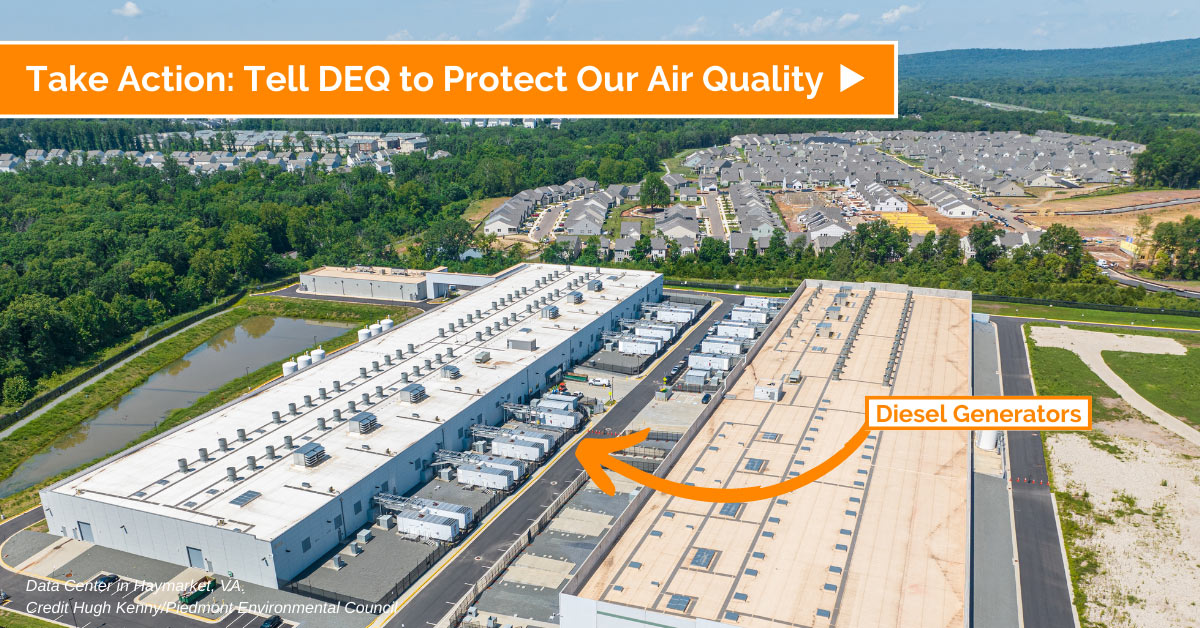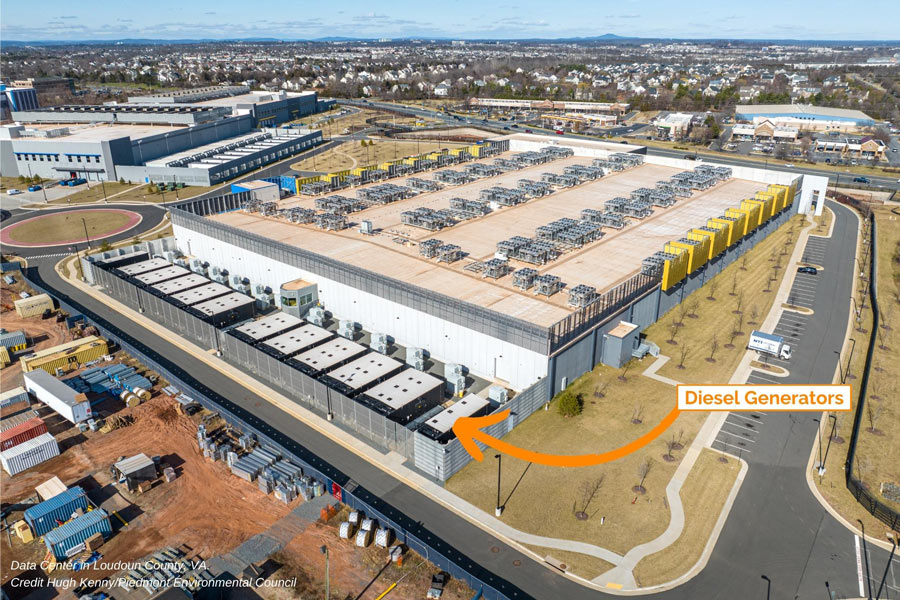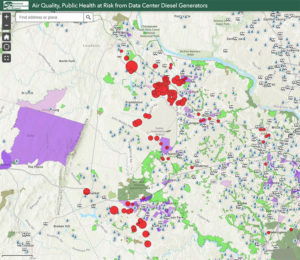Virginia is home to the largest concentration of data centers in the world, hosting 70% of global internet traffic, putting a significant strain on our energy system and electric grid. The VA Department of Environmental Quality (DEQ) is seeking comment on an order that will temporarily allow data centers in Fairfax, Loudoun, and Prince William counties to operate their generators for longer and more frequent periods of time, in violation of Virginia’s air pollution control laws, due to projected grid instability issues during peak summer energy usage.
DEQ is hosting a public hearing on Monday, Feb. 27 and taking comment by email, fax or mail through March 14. If you’d like to weigh in by email, use our online advocacy campaign today!

How we got here:
Northern Virginia (NoVA) is home to more than 150 data centers, and those data centers are straining our power grid – the industry as a whole accounts for roughly 21% of Dominion Energy’s total electric sales in Virginia today. That’s a lot of energy!
And yet, the data center industry has shown no signs of slowing down its expansion in NoVA and beyond – it is incentivized to do so. You may have seen in the news the Governor announcing that Amazon Web Services plans to spend an additional $35 billion on data center expansion in Virginia in the coming years. In addition, Prince William County is considering approval of tens of millions of square feet of new data center space, including the massive Digital Gateway proposal abutting Manassas National Battlefield Park.
In fact, the VA Department of Energy projects that data centers will be the driver of nearly all future electricity load growth in the Commonwealth through 2045. Meanwhile, the combined electricity demands from every other sector, including residential, industrial and non-data center commercial is projected to stay level or decline.
Environmental groups for years have voiced concern about how the unique accumulation of such an energy-hungry industry could impact our climate, air and quality of life; it seems that localities and state lawmakers are only now starting to take notice. In Loudoun County, which has become increasingly dependent on data center tax revenue, there is now talk of limiting data center development by the Board of Supervisors. This comes alongside news that Dominion Energy can no longer guarantee required energy transmission for data centers in Ashburn. It’s increasingly apparent that localities are approving too many data centers too quickly and Virginia is not at all prepared for the consequences.

What’s the big deal with the generators?
As mentioned before, data centers require an immense amount of energy to operate their servers, which operate 24/7 so the internet services being hosted run smoothly without interruption.
Sometimes, demand for electricity is really high, such as in the summer when air conditioners are in use, and the grid experiences strain or an outage. Data center facilities have emergency power generation on site to utilize in these cases. Unfortunately, the majority rely on highly polluting backup diesel generators, instead of more modern solutions like on-site solar, battery storage and more energy-efficient operations.
The order proposed by DEQ is a variance that would allow data centers to run these backup generators to supplement power needs whenever the grid is strained – usurping Virginia’s Air Pollution Control Laws that limit toxic emissions such as Nitrogen Oxides (NO2), Carbon Monoxide (CO), Volatile Organic Compounds (VOC), and fine particulate matter (PM-10 and PM-2.5).
This variance applies when PJM, which operates Virginia’s electric grid, initiates a “Maximum Generation Emergency/Load Management Alert” or “Post-Contingency Local Load Relief Warning.” These alerts have been on the rise in this part of Dominion Energy’s region over the last several years, with only one in 2019, 10 in 2020, 30 in 2021, and 82 in 2022. We can expect that the grid will be strained in such a way numerous times this summer, during peak load. The order and variance would expire July 31, 2023.
VA DEQ records indicate there are 101 permit holders able to operate under this variance. This totals around 4,632 commercial diesel generators, which range in size between 600 kW to 3500 kW (much larger than your typical whole-house residential diesel generator which is typically between 10 kW to 26 kW). Most of these data centers are located in the Ashburn and Sterling communities.
Remember, the strain the grid is experiencing today was predictable. However, the data center industry, our electric utilities and elected officials all looked the other way. And now DEQ is looking to give data centers a free pass to pollute the air in our communities, rather than establishing new pollution controls as a long-term solution for limiting future harm.

How does this impact me?
Diesel exhaust fumes are very bad for us. They are known to cause serious health conditions like asthma and respiratory illnesses and can worsen existing heart and lung disease, especially in vulnerable populations like the children and the elderly. The emissions are also harmful to our environment, contributing to ground-level ozone, causing acid rain, and releasing greenhouse gasses that warm the planet and alter the climate.
Depending on where emissions are released and accumulate, diesel-burning activities can also manifest as an environmental justice issue.
View PEC’s interactive data center web map to find out more about the locations of the various data centers covered by DEQ’s proposed ordinance.
How do we solve this problem?
The cumulative effect of all these diesel generators concentrated in Loudoun, Fairfax, and Prince William counties has been of concern for some time, and utilities will continue to struggle to keep up with the data center industries’ growing energy demands in the years to come.
In the short term, DEQ needs to do right by NoVA residents by not exempting data centers from following the laws in place to protect public health and the environment.
The proposed order would allow these diesel generators to operate without a requirement of the data centers to provide accurate data on how much pollutant is being emitted. (They instead need to provide a “calculation.”) That means air quality, particularly nitrogen oxide (NOx) and particulate matter (PM), could be very poor, without residents being informed or notified.
If the order does move forward, we urge DEQ to require real-time monitoring of pollutants and establish an alert system that notifies residents in the affected areas, so those sensitive to air pollutants can take precautionary measures. Though this will have a price tag associated with it, the data center industry has driven revenues across the state – this money should be used to protect public health and the environment.
Lastly, as new data centers continue to be built on our grid, DEQ should develop regulations requiring data centers to phase out diesel generators in exchange for energy efficiency measures, battery storage and less polluting backup power systems.
As for the cost of transitioning away from diesel generators, if data center companies like Amazon (its subsidiary AWS operates ~30 data centers in NoVA) are genuinely committed to their sustainability goals and being good community partners, they should be willing to make the investment.
What can you do?
The DEQ will be holding a public hearing on this decision and we urge you to attend if you are able:
Monday, February 27 @ 11 a.m.
Conference Room in Northern Regional Office
13901 Crown Court
Woodbridge, VA
How to comment: Being that this hearing is on a Monday at 11 a.m., we understand that most people will be unable to attend in person. You can instead submit comments to DEQ before March 14. Use our form letter to send a message to DEQ and your state legislators.
DEQ also accepts written comments directly by email, fax, and postal mail. All written comments must include the full name, address and telephone number of the person commenting and be received by DEQ by the last day of the comment period. Both oral and written comments are accepted at the public hearing. DEQ prefers that comments be provided in writing, along with any supporting documents or exhibits. All materials received are part of the public record.
Contact for public comments, document requests and additional information: Karen G. Sabasteanski, Office of Air Data Analysis and Planning, Department of Environmental Quality, PO Box 1105, Richmond, VA 23218 (phone 804-659-1973, fax 804-698-4178, email karen.sabasteanski@deq.virginia.gov).

